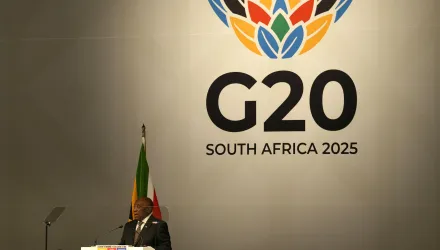WITH THE LEVEL of desperation at an all-time high in the Mideast, there have been increasing calls for the United States to press harder for a peace agreement vis-À-vis Israel and the Arab world. But the expectation that this can be done is simply unrealistic.
While nobody wants to be portrayed as uninterested in peace, or unwilling to push the "peace process" forward, the reality is that there is not much peace to be pushed at this time. To put it succinctly, the region is simply not ripe for peace, and such ripeness is essential for any effective agreement to take hold.
Consider the recent initiative, initially proposed by the Saudis and now supported by the Arab League: an offer to normalize ties with Israel if the Jewish state withdraws to the 1967 "Green Line" border and finds a just solution to the "right of return" of Palestinian refugees. At first glance, the offer seems like a bold step by the Arab world. However, those who advocate pressing the Israelis on the plan are disregarding one critical fact about the Mideast: There are no stable governments capable of making peace at this time.
Last month, Israel's Winograd Commission issued its interim report evaluating the Israeli government’s conduct during the war with Hezbollah last summer. Israeli Prime Minister Ehud Olmert was already suffering from record-low approval ratings, and this report left him and his coalition government in an even more perilous situation. However, assuming for a moment that Israel did have a leader with the political support to establish a peace agreement, whom would he or she find as a partner on the other side? The Arab League stated that its members would normalize relations with Israel only after it resolved crises with the Palestinians, Syrians and Lebanese — a proposition completely unattainable at this time.
On the Palestinian side, you have a Hamas-dominated government in a coalition with the more sensible Fatah party, led by President Mahmoud Abbas. Abbas, also known as Abu Mazen, is unwilling or unable to either establish rule of law in the Gaza Strip or to moderate the position of Hamas — an organization designated by the United States as a foreign terrorist organization (FTO).
The democratically elected Hamas believes that all of Israel is occupied Palestinian land and continues to call for Israel's destruction. Thus, unless Israel ceases to exist or Hamas suddenly moderates its stance (a task not even the influential Saudis and Egyptians have been able to accomplish), a Palestinian-Israeli peace agreement in the near future is impossible.
On the Syrian side, you have a state sponsor of terror aligned with Iran, that (at the very least) is allowing arms and fighters to flow both into Iraq and southern Lebanon, two countries of strategic importance to the United States. While the Syrian government at times indicates its willingness to enter into peace talks with the Israelis, its actions indicate the opposite. And, as we have seen for decades, the Syrian leadership revives its call for peace negotiations whenever it serves its purposes.
Finally, we have the "Lebanese government" — an oxymoron. The Lebanese are, once again, in a political crisis of their own, with the more moderate U.S.-supported government on one side barely managing to remain in power, while the Syrian- and Iranian-supported Hezbollah-dominated faction tries to overthrow it. Lebanon has rarely been a bastion of stability, but now is certainly not a time when it is likely the Lebanese will be able to arrive at a peace agreement with Israel, let alone with themselves. Not to mention that Hezbollah (another U.S.–designated FTO) also has as one of its stated goals the destruction of Israel.
Two critical factors impede the chance for peace to be reached in the Mideast today: government stability and government ability. Until those two very difficult issues are overcome, peace in the Mideast will be nothing more than a pipe dream.
Joshua L. Gleis is a research fellow at the Belfer Center for Science and International Affairs at Harvard University, and a doctoral candidate at the Fletcher School of Law and Diplomacy at Tufts University. The views expressed in this piece are the author's and do not imply endorsement by any part of Harvard University
Gleis, Joshua. “Mideast 'Peace' Progress Hope a Mirage.” The Providence Journal, May 20, 2007




